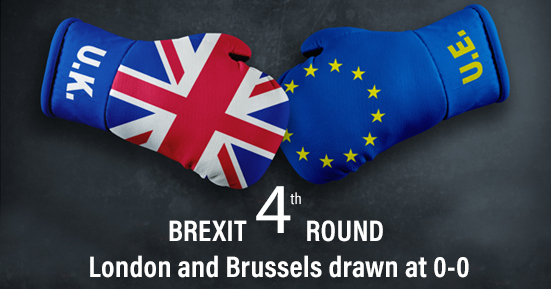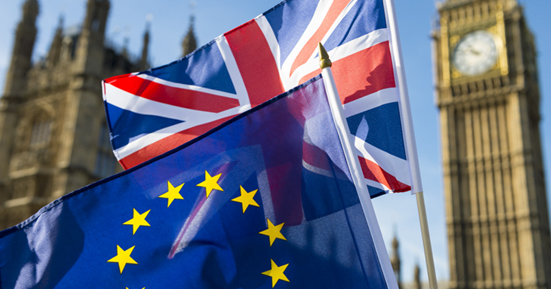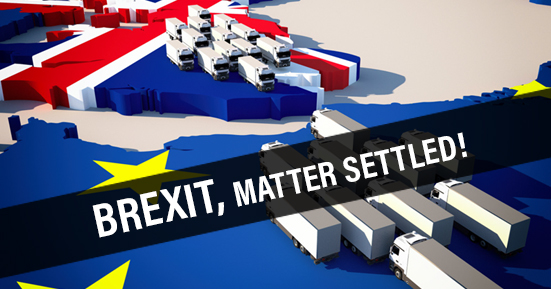Category Archive_BREXIT_
Your customs partner – CONEX FRANCE
- Home /
- Archive by category "_BREXIT_"

Despite having already brought about modifications to the rules of international trade with the United Kingdom, Brexit has not finished profoundly transforming how goods are traded.
After ICS (Import Control System), required since January 1st, 2021, for all goods moving from the United Kingdom to the EU, now it is the turn of the British GVMS (Goods Vehicle Movement Service) to enter the scene, followed during 2023 by the S&S GB (UK safety and security declaration system).
CONEX is rallying to support European and British customs operators with the various Brexit-related regulatory formalities.
For each regulation, an adapted via conex™ software solution!
ARE YOU READY ?
Contact us now for more information.
CONEX has the software solution for dealing with all these formalities.
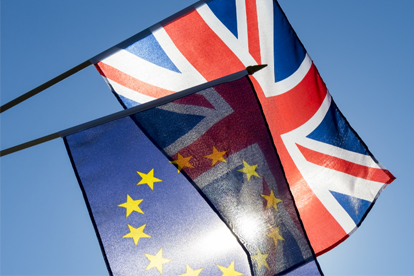
GB S&S – EU to GB security declarations coming into force on 31st October 2024
The British government announced the postponement of the deadlines for certain procedures in the post-Brexit cross-border customs context, effective since January 1, 2021. The British customs administration had presented a timetable for the gradual introduction of controls on imports into Britain from the EU, so that businesses could prepare progressively.
This calendar has been revised. Safety and security declarations for imports will be required from the end of October 2024.
What does that mean?
Currently and since January 1st, 2021, goods coming from third countries and destined for Great Britain must be subject to an entry summary declaration (ENS) which must be lodged in the GB S&S system. Goods from the EU benefited from an exemption until July 1, 2021 which was extended until January 1, 2022 and then until 31st October 2024.
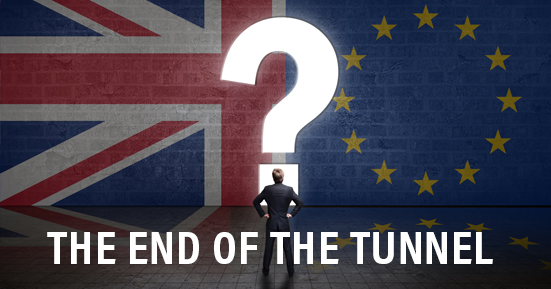
It's a never-ending cycle. Four years have passed since the announcement, in the wake of the 2016 referendum, of the UK's exit from the European Union. Brexit will come finally into effect on January 1st, 2021. Time is running out and the end of the year is going to be crucial.
So where are we really?
EU heads of state and government met on October 15-16 at the EU summit to assess progress of the talks and possibly give the green light to open a final round of negotiations. Despite the British threat not to respect the withdrawal treaty and the infringement procedure initiated by the Commission against the United Kingdom on October 1, some European diplomats still dare to evoke "positive" negotiation dynamics.
The British Prime Minister even believes it is possible that the two sides reach a compromise but stressed that "various issues remain to be resolved". "The European Union must understand that we are very serious about the need to control our own laws and our own regulations," he warned.
In fact, none of the last major obstacles, namely fishing rights, the rules of a “level playing field” in terms of competition and state aid, judicial and police cooperation as well as the means to settle disputes, has been overcome so far, as President Macron has pointed out.
Appearance of a new (virtual) border to take goods out of England
Without a deal between London and Brussels, the British government has estimated that 7,000 lorries could be stranded in Kent for up to two days before being allowed to cross the Channel. To remedy this disaster scenario, from January 1st, drivers of heavy vehicles will need to obtain a permit to enter the County of Kent, in which the port of Dover is located. The objective: to avoid traffic jams linked to customs controls. In fact, this measure will create a kind of border inside the country!
Drivers of lorries over 7.5 tonnes will therefore have to prove that they have all the necessary papers to transport their goods to the continent before arriving in this south-eastern county. Drivers who are not up to date with their paperwork will be detected via automatic recognition of their license plate, and invited to turn back, not without being fined 300 pounds!
“This is not a forecast or prediction of what will happen but rather a stretching scenario.” Minister of State Michael Gove told Parliament. Thus today, it is estimated that only "30 to 60%" of trucks would arrive at the border having completed the necessary formalities for their goods. Without these formalities, it will be impossible for drivers to board ferries to the continent.
Claire Fournier - CONEX
International Development Manager
Brexit - Fourth Round: London and Brussels drawn at 0-0
The fourth round of Brexit negotiations between the European Union and the United Kingdom ended last Friday like the previous three: with a failure.
"There has been no significant progress," said Michel Barnier, after a new round of sterile discussions with the British negotiators. Whether it is on fishing rights, on the question of governance or on the ‘level playing field’, each party remained camped on its positions. However, "on all these points, we ask for nothing other than for the Political Declaration to be respected," Michel Barnier declared.
December 31st is looming and without any compromise, it is the World Trade Organisation rules and its customs duties that will apply, while Boris Johnson continues to refuse to seek an extension of the transition period. "He seems to be incorporating the scenario of a no deal," said Aurélien Antoine, director of the Brexit Observatory. Such a situation means that, if there is no extension of the transition period, an agreement on a legal text must be reached by October 31st at the latest, that is in just under 5 months.
However, everything is still possible since a high-level meeting, agreed in the Political Declaration, to take stock of the negotiations must be planned before the end of June. Nevertheless, Michel Barnier concluded his speech at the end of this fourth round of negotiations by opening a door to the hope for a positive outcome: "... and if we maintain our mutual respect, our serenity and our determination, I have no doubt that, during the summer or at the latest at the beginning of autumn, we will find common ground between the United Kingdom and the European Union. And finally, that we will find an agreement on our partnership for the future."
Post-Brexit agenda update
After two unsuccessful first sessions, in a context weighed down by the COVID-19 pandemic, the United Kingdom and the European Union resumed their negotiations on post-Brexit relations on Monday 11th May.
Crystallisation of quarrels over Northern Ireland issues and fishing rights
Previous talks in late April cast considerable uncertainty over London and Brussels' ability to come to an agreement by the end of the year. "The United Kingdom did not want to make a serious commitment on a number of fundamental points," regretted Michel Barnier, EU's chief negotiator. Negotiators must theoretically decide in June whether or not to extend the transition period and thus allow themselves more time to negotiate. But London still rejects this idea, even if the Coronavirus epidemic has disrupted the calendar of discussions which now take place via videoconference. German Foreign Minister Heiko Maas warned on May 9: "The British government still refuses to extend the deadline (…) If this continues, we will have to face Brexit, in addition to the Coronavirus at the end of the year".
Among the quarrels is the continued existence of an EU delegation office in Belfast, Northern Ireland after the end of the transition period. The UK has formally rejected the idea twice, with British Minister Penny Mordaunt seeing it as a "political and community divide" in the province. Following the last round of talks in April, Mr Barnier stressed that the EU needs "hard evidence that the UK is making progress on new customs agreements".
A third round of negotiations ended on 15 May with British chief negotiator, David Frost and Mr Barnier blaming each other for the deadlock at the heart of the talks.
The United Kingdom is asking nothing more from the EU than a classic free trade agreement, along the lines of that concluded by the EU with Canada, around which several sectoral agreements could then be negotiated. The EU replies that it can only propose an ambitious trade deal to London if it is accompanied by solid additional guarantees in the area of fair competition, the famous "level playing field". In particular, the question of fishing rights remains contentious: the United Kingdom reaffirms its ambition to become an independent coastal state, with annual renegotiations on fishing quotas in its waters, a measure the EU refuses.
Until the next round of negotiations scheduled for June 1, the idea of a hard Brexit lurks, with a return to trade under World Trade Organization (WTO) conditions in 2021!
And meanwhile… the UK is also talking to the US
While post-Brexit trade negotiations with the EU have continued to be bogged down, further talks between the UK and the US began via videoconference in early May with a view to an ‘ambitious’ free trade agreement. More than 100 government officials from across the Atlantic are involved. The first session of negotiations is part of a calendar of meetings held every six weeks, the British government’s goal being to have an agreement signed before the end of the year, in parallel with the post-Brexit pact with the EU.
But on that front, nothing is straight forward either: the congressional and presidential elections to be held in November reduce the chances of reaching consensus in time. In 2018, the United States was the United Kingdom's most important trading partner, accounting for almost 19% of British exports and 11% of its imports.
Boris Johnson’s government wants to reach agreements covering 80% of its foreign trade within 3 years and has chosen to favour the United States, Australia, New Zealand and Japan.
A new customs tariff under study
In this context, on Tuesday the United Kingdom presented its new customs tariff, UK Global Tariff (UKGT), for a post Brexit context which will replace the EU’s CET (Common External Tariff). Customs duties will be maintained on a certain number of products from the agricultural, automobile and fishing industries in order to preserve the sectors concerned locally.
The UKGT retains a 10% tax on the importation of cars, but will remove all tariffs below 2%, which should make it simpler and cheaper than the European CET. In addition, customs duties will be eliminated on a wide range of products: 60% of trade would thus enter the United Kingdom duty free from the 1st January 2021, under WTO conditions or via the current preferential access, according to the government.
Border controls for the entry of goods
Still on the customs front, in a letter addressed to the Northern Ireland parliament, Boris Johnson acknowledges that there will need to be customs checks within the Northern Ireland territory for goods coming from Great Britain, after the post-Brexit transition period. These checks will be carried out in the three ports of Belfast, Warrenpoint and Larne.
A sensitive issue. As a principle, the Northern Ireland unionist parties have long refused anything that might appear to be a de facto border within the United Kingdom. Irish nationalists from Sinn Fein, for their part, refused any border between the Republic of Ireland (a member state of the European Union) and the British province of Northern Ireland. However, each year, 450,000 lorries transport goods from Great Britain to Northern Ireland to the value of €12.42 billion. Traders in Northern Ireland are claiming formality exemptions for products intended for the local market only. They have evaluated the additional cost of controls at £100 (112 €) per lorry. "A document detailing how the border between Ireland and Northern Ireland will function will be released soon," said a spokesman for Downing Street.
Immigration control
On May 18th, British parliamentarians also adopted post-Brexit immigration reform, which will end the right for workers in the European economic area to immigrate freely to the United Kingdom in 2021. This means workers from the European Union but also from Iceland, Norway, Liechtenstein and Switzerland. New entry criteria are not yet detailed, but Prime Minister Boris Johnson has already presented a points system project, which is expected to favour candidates in highly qualified occupations. The Republic of Ireland will be exempt from immigration rules under a free movement agreement which pre-dates the two countries joining the EU in 1973.
Brexit matter settled!
“It is settled,” Minister Michael Gove, number two of the British government, said last Friday, effectively closing the door to any further discussion on the possibility of an extension to the transition period beyond January 1st, 2021. “This brings clarity and certainty for companies and allows them to prepare,'' he insisted during a television interview. And for sceptics who may still doubt the determination of Boris Johnson’s government, Mr. Frost, Britain’s chief negotiator said to British MEPs: "Even if the EU demands it, we will refuse it."
So, it’s settled, even if the two parties deemed the last rounds of negotiations disappointing and without progress, and there are no less than 700 bilateral agreements to be negotiated before October 31st, given the deadlines for ratification by the United Kingdom and the 27 Member States involved. The working sessions will intensify and become weekly, including in July and from mid-August, in addition to the negotiation cycles initially planned. "We must now make progress on substance," warned Michel Barnier.
“A pragmatic and flexible approach” to Brexit from January 1st, 2021, according to a British government source
As soon as it leaves the European Union on January 1st, the United Kingdom plans to introduce gradual customs controls, so as not to penalise British companies already affected by the coronavirus crisis. A number of stages have been envisaged for the imports of goods from the EU up to July 1st. For the time being, Brussels has not promise reciprocity, and it is still expected that goods exported from the United Kingdom to the EU will be subject to declarations and controls, as is the case for goods imported to the EU from any third country.
In the first half of the year, British companies buying products from the EU (excluding controlled goods such as alcohol and tobacco) will have to keep a record of their imports but will have six months to declare them to customs. They may also benefit from the deferral of any duty payments until the goods are actually declared. Alcohols and tobacco imported from the EU will be subject to controls. Physical controls will also be carried out on high risk live animals and plants, either at destination or in approved places. Safety and Security declarations will not be required at this stage. However in April, for all Products of Animal Origin (POAO) such as meat, pet food, honey, milk or egg products, as well as all for plants and plant products subject to specific regulations, pre-notification and health documentation will be required.
From July, full controls will be introduced for all types of goods imported into the UK. British importing companies will have to make declarations at the point of importation and pay relevant duties and taxes simultaneously. Sanitary and phytosanitary products will be subject to an increase in physical checks and sample-taking by UK Border Control Posts. In addition, full Safety and Security declarations will be mandatory.
The Republic of Ireland and Northern Ireland: the next step?
A specific committee has been set up to finalise the Protocol on a solution to the situation concerning the future relations between the Republic of Ireland (EU Member State) and Northern Ireland.
This Protocol, which should come into force on January 1st, includes the following sensitive points:
- Establishment of all necessary checks and controls for goods entering Northern Ireland from Great Britain,
- Application of EU rules on customs and sanitary and phytosanitary protection,
- Presence of European Union representatives in the Northern Ireland territory, in accordance with Article 12 of the Protocol.
Only in these conditions can peace and stability between all communities on the island of Ireland be assured, the Good Friday (Belfast) Agreement (10th April 1998) be upheld and the EU Single Market be preserved, according to European Commission Vice President, Maros Sefcovic.


